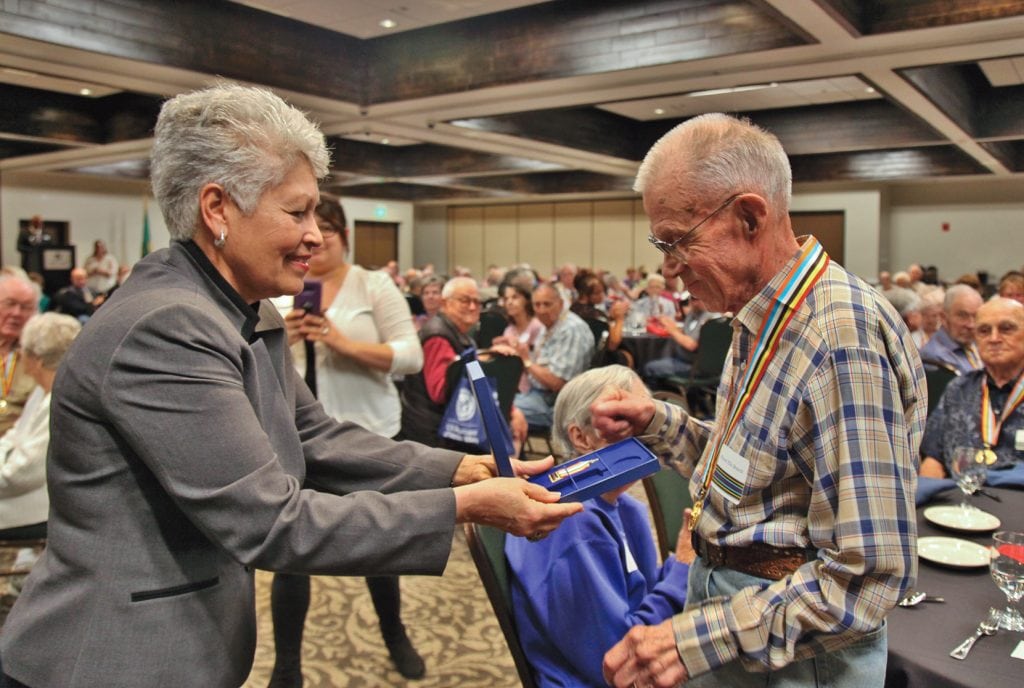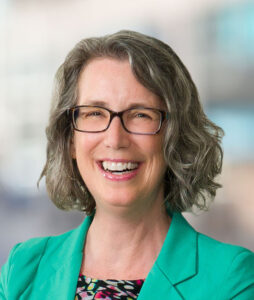
Home » Forgotten War vets remembered at peace medal ceremony
Forgotten War vets remembered at peace medal ceremony

July 12, 2018
Sixty-eight years after serving their country during the Korean War, 70 local veterans and their families received special recognition and appreciation for their role stopping the spread of communism in east Asia.
The consul general of the Republic of Korea and state director of the Washington Department of Veterans Affairs director presented 63 medals to veterans and seven to family members of veterans who had died or were too ill to travel during a June 8 ceremony in Kennewick.
“We have all heard the Korean War referred to as the Forgotten War so it is wonderful when we have opportunities to remember these heroes and express our gratitude and appreciation,” said Alfie Alvarado-Ramos, director of the Washington Department of Veterans Affairs.
The veterans received the Ambassador for Peace Medal, a commemorative medal that expresses appreciation from the Korean government to American service men and women who served during the war.
More than 33,000 Americans were killed in the Korean War and more than 103,000 were wounded, according to a 2017 government report. More than 7,600 Americans are still unaccounted for.
To be eligible for the medal, veterans had to have served during the Korean War from June 25, 1950, to July 27, 1953. It is also available for veterans who participated in United Nations peacekeeping operations through 1955.
Leonard Sevigny, 84, of Richland, who served in Korea from 1952-53 in the 1st Marine Division as a radio operator, said he appreciated the recognition.
He said he wished his brother George was still alive to see his medal because said he would be ribbing him about it. His brother served in the Marine Corps after being drafted, but he never went overseas.
“If he was alive today I’d be teasing him today about that ribbon,” he said.
Sevigny said in addition to two brothers who served in the Marines, he had a brother in the Navy and one in the Army, as well as four nephews in the Marines.
He said his work as a radio operator in Korea meant he was a “communications man.”
“We helped anybody who needed information or to call in artillery or anything required of us,” he said.
“The war was something that you got used to very quickly. Veterans were with you and told you what you should and shouldn’t do. If you listened to them, you will get by. Unless you’re very unlucky. I was fortunate, but I lost a good friend,” he said.
Sevigny said a mortar shell killed his buddy Jack Weber, a 19-year-old Texan who worked as a photographer on the front. The two had gone through combat training together at Camp Pendleton.
“He was wounded badly and he didn’t make it,” he said.
Sevigny enlisted in the Marines after dropping out of Gonzaga University. He had been attending on a boxing scholarship.
“I lasted 11 weeks and decided that I didn’t want to go school. One day I walked by a recruiting office,” he said, explaining that a Navy recruiter said he could join, but only after a six-month waiting period. He declined and walked out.
A Marine recruiter then informed him that his branch didn’t have a waiting period.
“I went home, was back Monday, then over in Seattle to be sworn in, then on a slow train to San Diego and in boot camp before I could turn my head,” Sevigny said.
Already in excellent shape thanks to his boxing scholarship, Sevigny sailed through boot camp. He said he would have stayed in the service if he hadn’t met his future wife, to whom he’s been married 64 years. They have six children, 18 grandchildren and six great-grandchildren.
The Moxee native said he was a jack of all trades during his post-military career, working with farm machinery; water treatment plants; boiler houses; heating, ventilation and air conditioning; refrigeration and electrical.
Sevigny retired in 1991 from Richland’s Areva as an engineering assistant.

Richard Brandt, 88, who lives at Richland Brookdale, an assisted living community, also received a medal — though he didn’t serve in Korea.
“It’s an interesting story,” he smiled.
Brandt received a draft deferment while studying for his college chemistry degree, but was drafted into the Army as soon as he graduated in 1953. He then was sent to chemical weaponry school in Anniston, Alabama.
His whole company was scheduled to go to Korea, but a twist of fate sent him in another direction.
While at a dental appointment, Brandt missed a meeting as well as the chance to serve in Korea.
Instead, he was deployed to Germany where he worked as a soil technician with the 862nd Engineer Aviation Battalion.
He worked in Darmstadt, Germany, checking the compactness of the soil to upgrade and lengthen runways.
“It was a strange field but I enjoyed it,” he said.
His wife, Phyllis, joined him overseas where they lived in a small town with a German family.
Brandt said he saw the troops “training that I would pass every day and it made me feel guilty I wasn’t there (in Korea) but it made me feel lucky I was there at the same time.
“Looking back on it, it was some of the best work I’ve done — in the Army,” Brandt said.
After completing his enlistment, Brandt traveled around the U.S. for chemistry-related jobs which eventually brought him to Hanford.
Jim Lancaster Jr., an 88-year-old farmer who lives about a mile outside of Basin City, called the June ceremony impressive since the Korean War is “kind of a forgotten war.”
He served with the Army’s 15th Field Artillery field from 1950-51 in Korea hauling ammunition to the firing batteries.
“It was a little scary at times but there wasn’t much you could do about it but do it,” he said.
State Rep. Brad Klippert and Kennewick Mayor Don Britain also attended the event and expressed their thanks and appreciation for the service and sacrifice of each veteran and family member in attendance.

Local News
KEYWORDS july 2018




